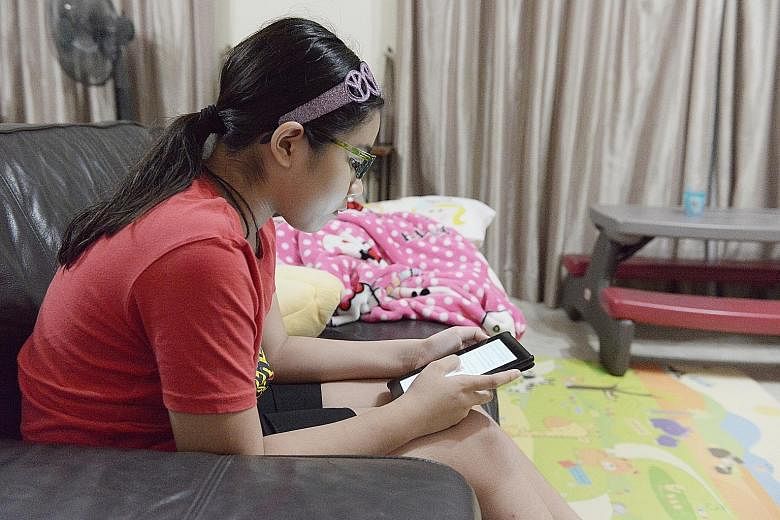It is nearly 10pm on a Friday night.
Emily Selva, 10, is brushing her teeth, getting ready for bed. Her sister Calista, eight, who is unwell, is lying on a couch in the living room, half-watching a nature documentary on TV.
"It's been a long week," said their mother Samantha D'Cotta, 43, at their Woodlands apartment.
Emily and Calista get fewer than eight hours of sleep a night due to their busy schedules. They both go for Chinese tuition; Emily also attends ballet and supplementary classes, while Calista has violin lessons and takes badminton as a CCA.
"Trying to get them to sleep at 8pm is virtually impossible," said Madam D'Cotta, a housewife.
-
Tips for parents
-
It is important to ensure that children develop good sleeping habits.
Experts recommend that children aged six to 13 should get nine to 11 hours of sleep every night.
So a primary school pupil who needs to wake up at 6am should be asleep by 9pm the night before.
Children should avoid caffeinated drinks altogether, and avoid large meals in the two hours before going to sleep.
Aim to get children into bed half an hour before they are supposed to go to sleep. This should give them time to unwind with a quiet activity so they can enter sleep more naturally.
Quiet activities, such as reading a bedtime story or listening to soft music, can help.
Keep computers and TVs out of the bedroom. Ideally, keep electronic devices out of bedtime routine as they can interfere with sleep quality.
Ensure that the sleep environment is conducive to shut-eye. The room should be dark, have minimal noise and be sufficiently cool. Children should be wearing comfortable bedclothes.
Insist on a regular sleep schedule as far as possible, with consistent sleep and wake-up times every day, including on weekends and holidays.
SOURCE: DR MICHAEL LIM, CONSULTANT AT THE DIVISION OF PAEDIATRIC PULMONARY & SLEEP AT THE NATIONAL UNIVERSITY HOSPITAL.
-
Effects of sleep deprivation
-
A lack of sleep could impact cognition and academic performance, say experts.
Dr Teoh Oon Hoe, head and senior consultant at the respiratory medicine service at KK Women's and Children's Hospital's department of paediatrics, said: "Sleep deprivation in school-aged children can cause mood problems, behavioural problems such as hyperactivity, and cognitive problems that affect their learning and memory. The ability to focus and pay attention is affected, making it difficult for the brain to receive information.
"During sleep, the brain consolidates the information received while awake into memory. Lack of sleep and poor-quality sleep also affect the brain's ability to process and consolidate the information received."
Such children are also at higher risk of having depressive symptoms, anxiety and withdrawal, added Dr Michael Lim, a consultant at the paediatric pulmonary and sleep division at the National University Hospital.
Sleep deprivation is also associated with long- term health issues like obesity and a higher risk of developing Type 2 diabetes in adolescence.
He said: "Regardless of how busy one's schedule is, parents have to ensure that their child gets sufficient sleep time.
"Education on the importance of sleep and how to ensure children get sufficient good-quality sleep could be part of school education."
"Singapore is such that we don't want our kids to not have something extra. If they just went to school, came back and did their homework, I'm sure they would be able to fit in enough sleep."
On days when they are less busy, Emily and Calista get home from Greenwood Primary School - a seven-minute walk from home - at about 1.30pm, have lunch, and then spend about half an hour watching TV, 11/2 hours doing homework, have dinner at 6pm, shower, and, if time permits, do some reading.
Said Madam D'Cotta: "I try to push them to sleep earlier, but it depends on what time they get back, whether they have supplementary classes and so on."
To discourage them from staying up later than necessary, she confiscates her daughters' cellphones during the week, keeps the family computer in the master bedroom, and imposes an automatic 9.30pm "curfew" on Emily's Kindle reading.
On school days, the two girls usually go to bed at 10pm and wake up at 6am. But it's one thing to head to bed; another thing to fall asleep.
Emily shares a bedroom with her older sisters, who sometimes stay up late, and Emily has trouble sleeping. Calista sometimes stays up till 11.30pm. "I read my books under my blanket at night. I hide books under my pillow - books like Geronimo Stilton, so no one can see... I want to complete my half-done books," she said.
But this can take a toll the next morning. "During silent reading in the hall, I fall asleep on my books."


